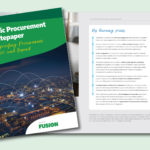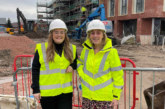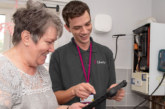 Coronavirus is a turning point for public sector procurement, says Andrew Gray, Member Relationship Manager at Fusion21.
Coronavirus is a turning point for public sector procurement, says Andrew Gray, Member Relationship Manager at Fusion21.
The coronavirus pandemic has led to increasing amounts of best practice taking place within public sector procurement, Fusion21’s ‘Futureproofing procurement in 2020 and beyond‘ report has found.
The report’s findings are based on the key points made during a series of virtual webinar sessions hosted by Fusion21 during lockdown, which gave our members the opportunity to share their experiences to-date, as well as their predictions for the future.
In March, the Government called for public bodies to urgently review their contract portfolio and inform suppliers they believe to be at risk that they will continue to be paid as normal, even if service delivery is disrupted or temporarily suspended.
The Cabinet Office’s action notes, including PPN 02/20, stated that this should be the case until at least the end of June — but it seems that genuine collaboration between organisations and their contractors and suppliers could be here to stay, with more sustainable and productive longer-term relationships being formed.
Procurement projects
According to our members, public sector organisations are not putting procurement projects on hold as a result of the pandemic, instead they have been extending tender periods, and entering into earlier engagement with potential contractors and suppliers.
Meanwhile, procurements that were previously stuck in the pipeline are being decided upon, with senior leaders freed from more day-to-day operational issues, giving executive teams more time to spend on longer-term strategic planning.
As we continue to emerge from the crisis, achieving value for money is likely to become even more important, and it’s up to individual procurement professionals and their teams to demonstrate their strategic importance.
Meanwhile, the Hackitt recommendations will lead to better quality and safer work being delivered, with organisations avoiding a ‘race to the bottom’. A move away from quality/cost weightings and towards whole-life costings will necessarily require organisations’ executive teams to trust procurement professionals’ expertise.
Our members are excited by the prospect of being able to adapt and innovate, and to achieving value for money, while also using the procurement process to achieve more sustainable outcomes that benefit our communities.









